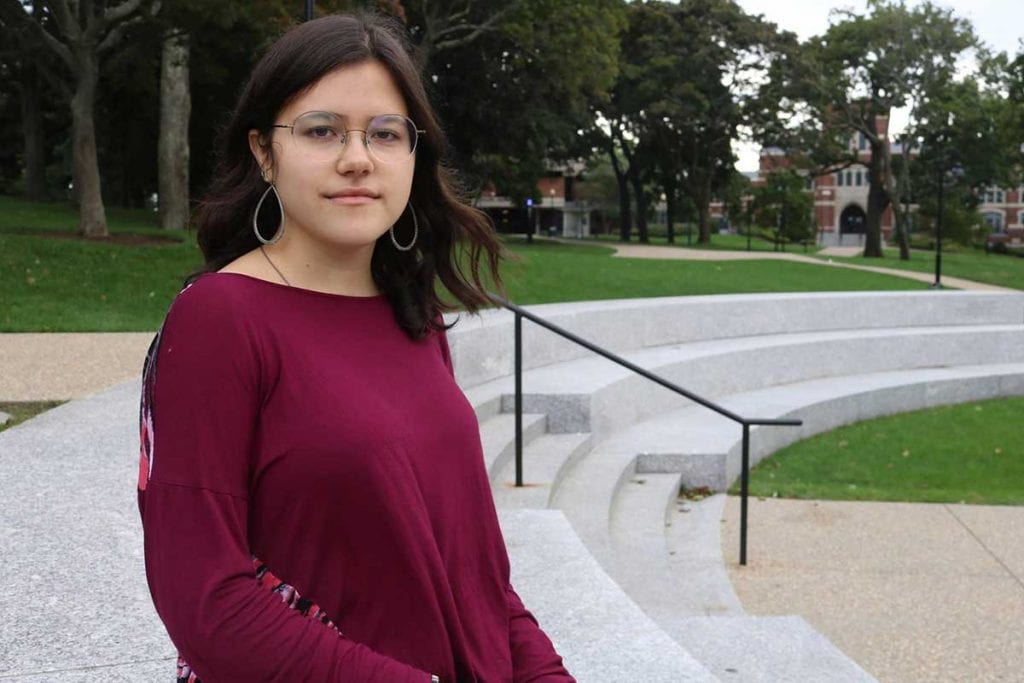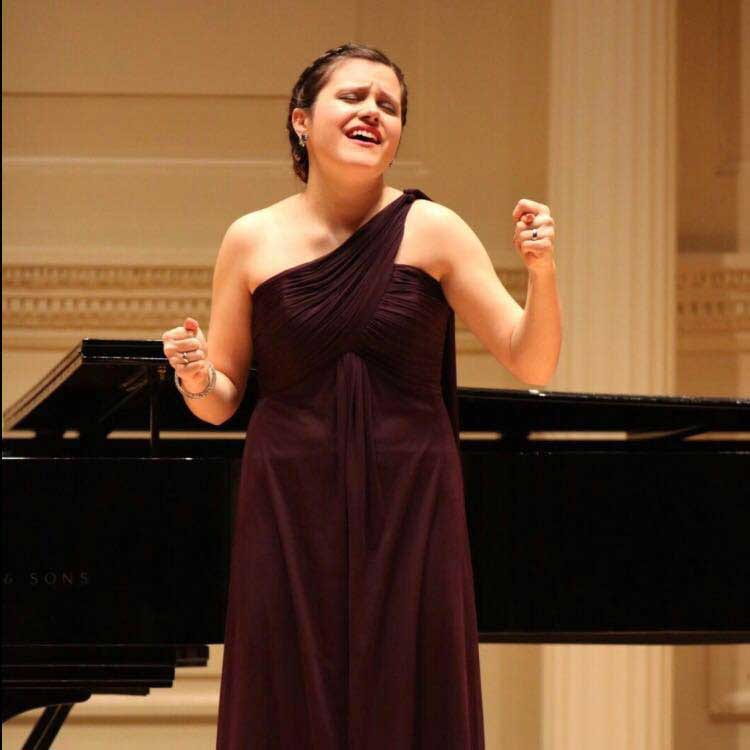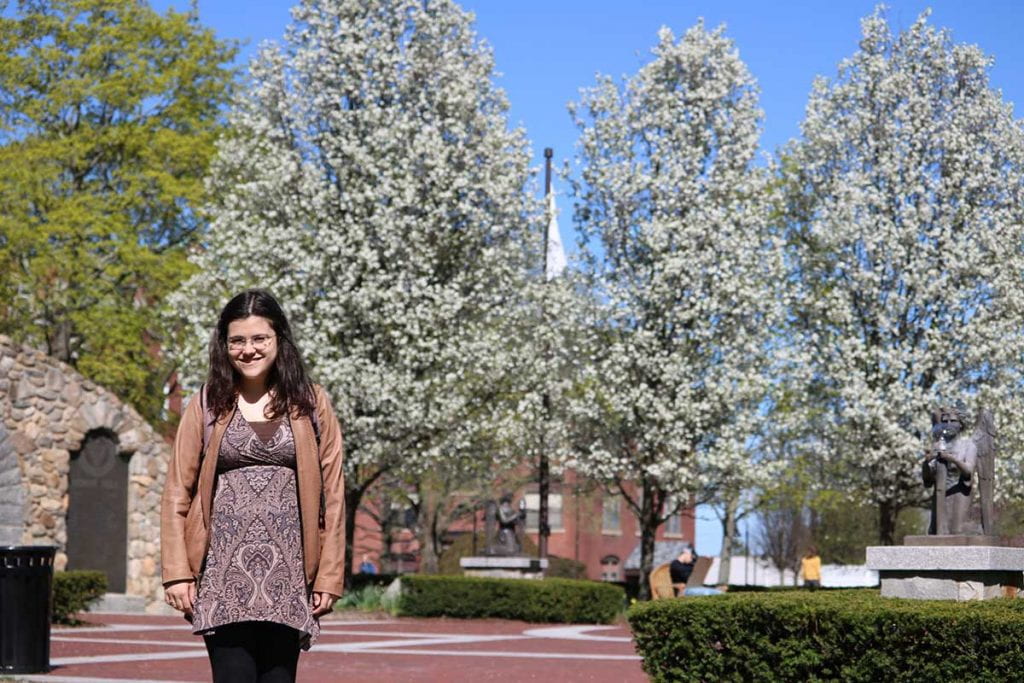Unable to study in Havana, Grace Maffucci ’22 explores Afro-Cuban culture through independent study
Grace Maffucci ’22 has accepted a Fulbright award to teach English in Mexico following graduation.
grace maffucci in mexicoBy Vicki-Ann Downing
Grace Maffucci ’22, a double major in music performance and Spanish, was supposed to be the first Providence College student to study in Cuba. She planned to spend this semester at the University of Havana, learning about Cuban and Caribbean culture.
When the pandemic overturned those plans, Maffucci regrouped. She designed an independent study with Dr. Monica Simal, associate professor of Spanish, to explore Afro-Cuban culture in music, literature, and art before and after the revolution of 1959. As a jazz singer, she was inspired by her love of Afro-Cuban jazz, which fuses American jazz with African drumbeats and rhythms and a touch of Latin-American salsa.
“Most Spanish majors go to Spain, but my interests lie in Latin America — jazz music, Latin-American culture, and African-American culture,” Maffucci said. “I’m interested in people who have been severely oppressed and, in the aftermath and ongoing oppression, have produced beautiful art forms and rich cultures. It’s inspiring to see human resilience.”

Maffucci received an Undergraduate Research Grant from the Center for Engaged Learning to support her research.
“Cuba was one of the last countries to eradicate slavery,” Maffucci said. “People talk about racial issues in the United States, which of course are real and prevalent, but in Latin America those issues also exist. In Cuba, there was a great disparity between Black Cubans and white Cubans. I’m interested in that Afro-Cuban dynamic. When Cuba underwent a political revolution, what did that look like for the Afro-Cubans? Were they represented? I’ve read poetry by Cubans who were enthusiastic about the Communist revolution, but you don’t hear a lot from the Black perspective.”
Simal praised Maffucci’s intellectual curiosity, which led her to investigate beyond the College’s core curriculum and find connections among multiple interests.
“Grace intuitively understood the importance of connecting her findings in her Spanish, music, history, theology, and biology classes to understand the historical struggles of African descendants in the U.S.A. as well as the global south,” Simal said. “It is always a joy to engage in critical dialogues in the target language with Grace, since she demonstrates how well-informed and sophisticated her ideas are. She also provides nuances to our conversations thanks to her ability to make insightful connections. It is clear to me that Grace has impacted me as a professor, and I can predict that she will have a brilliant future.”
Growing up in New York City, Maffucci often heard people speaking Spanish, but she did not study the language until she was in high school in Mamaroneck, N.Y., where she moved at age 12. Her early years were spent in Stuyvesant Town, a planned community of apartment buildings, parks, and recreation facilities in New York City. Most of her neighbors were Puerto Rican. Maffucci remembers neighborhood events at which her Italian American father would contribute the lone biscotti to a table of flan.
“It was like communal living before college. We did our laundry downstairs with the neighbors,” Maffucci said. “We walked every day; we didn’t have a car. Growing up in the city, I wasn’t able to be sheltered, and I am very happy about that. We dealt with stuff. It was a rich experience for me because my world view got bigger.
“As a white person, I was a minority in my environment. I was used to it and it taught me a lot. When I moved out of the city and became part of the majority, it was almost weirder. But I’ve learned that no matter where you are, there will be people who can teach you. In the suburbs there are not so many Hispanic or Black families, but families still have rich histories.”
Maffucci, a music performance major with a concentration in voice, has loved to sing “pretty much my whole life.” At 16, she performed a solo at Carnegie Hall, singing “When Sunny Gets Blue” (Marvin Fisher and Jack Segal) as part of the Larchmont Music Academy Student Honors Recital. For a time, she considered entering a conservatory to study vocal jazz. When she was a high school junior, her mother searched online for music open houses at colleges in the Northeast, and they scheduled a visit to PC.

“I looked at PC first and after that, everything else fell short,” Maffucci said. “We drove up and met people in the music department and toured the campus. It was very informal. I just got there and decided, ‘I am going to go here.’ It’s not like I even saw that much. I think, as a person of faith, when God wants you to do something, you feel at peace with it. I didn’t question it. I just kept remembering how much I liked being on campus.”
Maffucci, who has a minor in Latin American studies, is amazed at how she has been able to combine her interests, and how her courses have intersected in her senior year.
In Ethnobotany with Dr. Maia Bailey, associate professor of biology, she learned how cultures, plants, and the natural world interact by reading about indigenous cultures and their traditions, African American farming, and environmental racism. In the Diversity of Latin American Religious History with Rev. David Orique, O.P., associate professor of history and director of the Latin American and Latina/o Studies Program, she studied what happened when Europeans met native Americans and Catholicism met indigenous religion.
In Hispanic Civilization with Dr. Javier Mocarquer, assistant professor of Spanish, she learned about the cultural history of Spain and Spanish America by examining the arts — painting, sculpture, and architecture. She did a project on a work from the Museum of Contemporary Indigenous Art in Cuernavaca, Mexico, which she visited virtually.
“I saw this piece of sculpture, very colorful, with bright colors, grass, flowers, animals, and a saint, and realized he is St. Isidore, the patron saint of agriculture,” said Maffucci. “There is a God figure in the sky with white hair, the God of Abraham, but this is indigenous art, and it is obviously their culture. The sanctity of the earth is very evident.
“I see that my Ethnobotany class connects to my Latin American theology class, which mixes religion with a reverence for the earth,” Maffucci said. “It’s just amazing how everything I am studying is connected.”
Maffucci volunteers with the Rhode Island Family Literacy Initiative, attending a citizenship class on Saturday mornings at the Providence Public Library and meeting with students during the week to help them prepare for their citizenship interview and examination. Through PC’s Feinstein Institute for Public Service, she interns with Fundación Esperanza de México, helping that organization document its work in Tijuana, Mexico, to build homes for families in need through a common fund.
This summer, she will work as a teaching assistant in an 8th grade writing course with Breakthrough New York, a program of Breakthrough Collaborative, which aims to provide educational equity to underserved students around the country.
A common thread is her Catholic faith. Her involvement with Campus Ministry began with the FaithWorks program, which introduces new students to service opportunities in the Diocese of Providence. For two years, she sang with Schola Cantorum at the 11 a.m. Sunday Mass in St. Dominic Chapel. This year, she is a cantor. As a member of the Women’s Study Group, she attended the United Nations Commission on the Status of Women with Sister Anne Frances Klein, O.P.
“Continuing to go to Mass and hearing the Gospel, you realize how Jesus was fighting for the little guy and was there for the marginalized. He criticized those in power who were abusing power,” Maffucci said. “I’ve been able to reconcile my Catholic identity with my affinity for Latino/a culture, the language, and my interest in music. College has helped me realize what’s important to me and to develop it in new ways.”
Her life was shaped by her family experience. Her mother is president of the Human Life Foundation, founded by her grandfather, and editor-in-chief of the Human Life Review. Her 26-year-old brother, James, has autism. Navigating the pandemic, with services they relied upon no longer available, has brought the family closer.
“I don’t think I would have been able to handle my brother without my older sister,” Maffucci said. “It has been a challenge and a grace in my life. Learning patience, which I haven’t mastered, and empathy, true kindness, comes from him. He is one of my best teachers. He will be part of my future.”
So, too, might be a visit to Cuba, someday.
“I’m surprised at how OK I am about missing it,” Maffucci said. “I’m at peace with it. I know that in my future, I will be going somewhere.”
magazine essay: god’s providence in song





